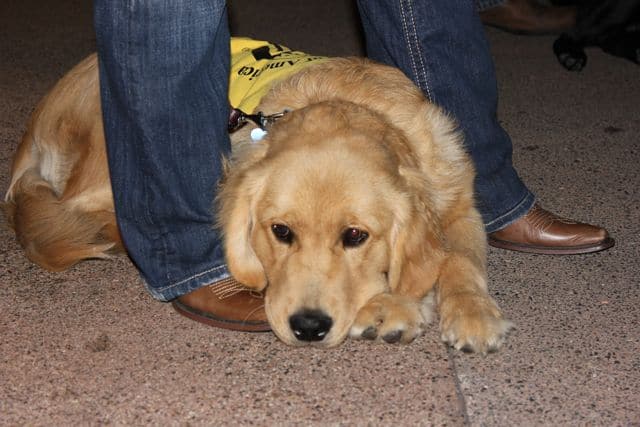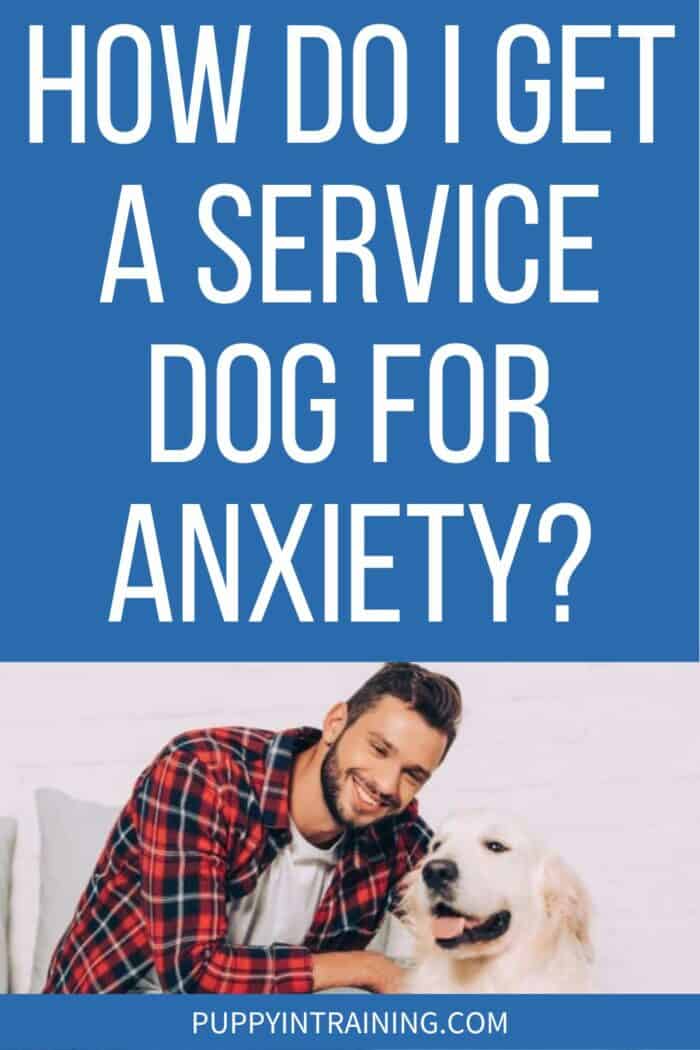Can You Get A Service Dog For Anxiety And Depression?
This post may contain affiliate links. We may earn money or products from the companies mentioned in this post.
Is it possible to get a service dog to help with anxiety and depression?
Yes, it is!
In fact, psychiatric service dogs are becoming very common for people with a wide range of mental health conditions.
Essentially, service dogs are dogs that have been specifically trained to recognize a problem or a situation experienced by their human, who is physically or mentally disabled, and react in a very specific way to the person’s problem, situation, or symptom to aid the human to live a more ‘normal’ life.

There are a range of different service dogs that are trained to work with people with different physical and mental disabilities such as hearing, guide, mobility, and psychiatric service dogs. However, not all people qualify to have service dogs.
In fact, caring for a service dog could be detrimental to your care if you and your psychiatrist have not carefully planned out how a service dog could be a healthy part of your treatment plan.
For a better understanding of what service dogs are and how they could benefit someone with anxiety or depression, keep reading!
What Is A Service Dog?
A service dog is not considered a pet by the American Disability Act.
Service dogs are considered professionals that have very important, specific jobs and are better understood as companions and teammates rather than pets.
A service dog is a dog that is trained to perform specific tasks for a person with a physical or mental disability.
They are trained to identify issues or assist with a disability. These dogs have special rights and are therefore allowed in any place that the person with the disability is allowed.
Service dogs help over 40,000 United States citizens each day in many different ways! They are integral to a disabled person’s life, as they fill the space that is left by the disability.
It is important to know that service dogs are not working dogs.
Working dogs perform jobs in the police force, search and rescue, the armed forces, and on various kinds of farms.
These dogs have very specific jobs to do and are not considered as ‘pets’ either.
Are There Different Kinds Of Service Dogs?
There are several different kinds of service dogs depending on what they are trained to do and what disability, condition, or illness they are trained to assist.
1. Hearing Service Dogs
Hearing or alert service dogs are used by deaf people or people who are otherwise hard of hearing. These dogs help the person by making them aware of things in their surroundings that they may not hear.
These things may be a phone ringing, cars, people talking to them, or alarm sounds. The dog will hear these sounds and make the person aware of them by nudging their hand or providing some other alert signal.
2. Guide Dogs

Guide dogs are used by people who are partially or completely blind. These dogs help blind people navigate through the world around them.
They will help lead their owners around obstacles, up and down stairs, through traffic, through a shopping center, and may even move things out of the way for them.
Guide dogs are some of the most well-known service dogs, as they appear in movies and adverts frequently. However, there are still many more kinds of service dogs out there!
We raised a yellow Labrador Retriever named Dublin who became a working guide dog!
3. Medic Alert Service Dogs
Medic alert dogs are used by people who have a physiological medical illness such as diabetes, blood pressure issues, and epilepsy.
These dogs are trained to use all of their senses to detect when there are changes in their human’s body that signal something is about to go wrong.
The dog may, for example, detect that their human’s blood sugar is low and signal them to eat something.
Alternatively, they may remind their person to take medication at specific times during the day or even warn their human that a seizure is about to happen so the person can lay down to avoid injury.
These medic alert dogs may run and get someone for help, protect their human when they are vulnerable, or lick their faces to bring them back to awareness.
4. Autism Assistance Service Dogs
Autism assistance dogs are not quite as well-known as the aforementioned types of service dogs, but they are still very important!
These helpful dogs are used by people who have Autism Spectrum Disorder to help them navigate ‘normal’ life. These dogs provide a sense of comfort to the human and can help build their confidence in social settings that may be scary.
We raised one of Raven’s Golden puppies who became an autism assistance service dog!
5. Physical Support Or Mobility Service Dogs
Some people need mobility service dogs. These people may be wheelchair bound, use crutches or a walking cane, be elderly, or have multiple sclerosis or other disorders that affect their balance.
These dogs will provide physical support to the person who battles with their mobility and balance. They may also seek help when their human falls over or gets stuck.
We raised a yellow Lab named Adelle who became a mobility service dog for a veteran confined to a wheelchair!
6. Psychiatric Service Dogs
Psychiatric service dogs are a fairly new addition to the service dog world. They are used by people who have diagnosed psychiatric disorders and need a bit of extra help navigating their lives.
People with anxiety disorder, depression, schizophrenia, bipolar disorder, PTSD, or severe panic disorder are all able to use psychiatric service dogs.
These service dogs can go into a room ahead of their person with PTSD, for example, and flip on light switches to help ease their panic.
These service dogs will help with general comfort and tactile grounding. To put it simply, tactile grounding gives a person something physical to touch to help them cope with their anxiety, etc.
We raised a Golden Retriever named Apache who became a PTSD service dog for a veteran who actually trained dogs in the military!
7. Allergy Service Dogs
Allergy service dogs are used by people who have severe, life threatening allergies. These dogs are trained to sniff out the element their human is allergic to in their food or surroundings and alert the human to avoid the food.
We also raised Archer who became a service dog for a little girl who suffered a traumatic brain injury.
How Do Service Dogs Help With Anxiety And Depression?
Psychiatric service dogs can help people with anxiety and depression. Unfortunately, people who suffer from anxiety and depression often do so quietly and do not get treatment.
Those that do get treatment often do not know they can apply to get a service dog as part of their treatment plan.
Service dogs for people with anxiety and depression are specifically trained to note the signs of an anxiety attack approaching and are trained to react by distracting their human and helping them de-escalate their emotions and try to avoid the attack.
If a person is suffering from severe depression, a service dog could help aid them by reminding them of and keeping them to a schedule to prevent a severe slump from occurring.
A psychiatric service dog can help a person navigate stressful situations for them, such as crowded places, restaurants, grocery stores, and doctor’s offices.
How Do I Get A Service Dog For Anxiety And Depression?
To acquire a psychiatric service dog, you will need to talk with your psychiatrist about your treatment plan. Just because you have a psychiatric disorder does not mean you are eligible for a service dog.
First, you and your psychiatrist need to decide whether the responsibility of owning a service dog is something that you can manage in your mental health journey.
You also need to be able to take care of your service dog financially. However, there are some not-for-profit organizations that provide service dogs to people at little to no cost, as they raise funds to help people who cannot afford service dogs.
Additionally, a service dog needs to be a viable part of your treatment plan as an additive and not just something to have.
Once you have come to the conclusion with your psychiatrist, you can apply to a variety of different services that train and offer service dogs to people who need psychiatric service dogs.
Alternatively, if you have the time and ability, you can train your own dog!
Do I Have To Get A Professionally Trained Service Dog?
Professionally trained service dogs are very expensive.
They can cost between $25,000 and $50,000 depending on their age, completion of training, type of breed, and what they are specifically trained for.
Due to their high costs, many people cannot afford a professionally-trained service dog. However, you do not need a professionally trained service dog.
You can train your own!
The Canine Good Citizen test is a 10 skill based test that is a great starting point if you plan on training your own service dog.
One thing I’d like to note is that not every dog has the temperament to be a service dog. Over the years we’ve raised many service dogs puppies in training and more often then not they are dropped from the program for various reasons.
What Is The Difference Between A Service Dog And An Emotional Support Animal?
Emotional Support Animals are different from service animals.
Emotional support animals are not recognized by the American Disability Act, and they therefore do not enjoy the same rights as service dogs.
According to the American Disability Act:
“If the dog has been trained to sense that an anxiety attack is about to happen and take a specific action to help avoid the attack or lessen its impact, that would qualify as a service animal. However, if the dog’s mere presence provides comfort, that would not be considered a service animal.”
ADA Website
A service dog is
Under the ADA, a service animal is defined as a dog that has been individually trained to do work or perform tasks for an individual with a disability. The task(s) performed by the dog must be directly related to the person’s disability.
ADA Website
However, sometimes what a person with anxiety or depression needs is an emotional support dog instead of a service dog.
You can also train your own!
Read my article on how to train your emotional support dog.
What Is The Best Psychiatric Service Dog Breed?
There are many breeds of dogs that are perfectly suited to being service animals due to their predictable temperaments and low-maintenance grooming needs.
These two things (temperament dependability and low maintenance) are the essential requirements for a dog to be considered as a service dog.
A service dog needs to be cared for by a person that is physically or mentally disabled, so a high maintenance dog is impractical.
Dogs that are calmer and easily trainable such as Labradors, Golden retrievers, German Shepherds, Teddy Bear dogs, and Maltese are all ideal candidates for psychiatric service dogs.
FAQs About Service Dogs For Anxiety
Can a place of business ask me about my service dog and disability?
A place of business cannot, under any circumstances, ask you to prove that you are disabled, force your dog to perform “tricks” or its job, or ask you about your disability. To do so would infringe on your basic human rights and is completely illegal.
However, a place of business may ask two questions to determine whether your dog is a service dog or not.
- Is this dog a service animal that is required for assistance with a disability?
- What task/job/work has this dog been trained to perform?
A simple yes or no is all that is required to answer the first question; you do not need to go into detail.
As for the second question, just a brief outline of their job is necessary, and no detail is required.
You could say, “This dog alerts to low blood sugar, or panic attacks, or retrieves a phone during a seizure.”
Do I have to put my service dog or emotional support animal in a vest?
It is not required by the American Disability Act for service animals to wear a vest or tags at all times that clearly identify the animal’s duty.
However, it is required by law that service dogs be harnessed or leashed in some way when they are in public places.
However, the vest does come with some perks.
A medic alert could be attached to the vest if your service dog is trained to find someone to bring to you if you are having an anxiety attack or performing risky behavior spurred on by depression.
Can I be denied access if I have a service dog?
It is against the law for any place of business or public space to deny access to a service dog according to the American Disability Act.
However, if the dog in question behaves erratically or breaks from their training, then the place of business is within its rights to ask the person to leave.
Rolling Over On Service Dogs For Anxiety…
If you suffer from anxiety or depression, you may wonder how you could get a service dog trained specifically to help you cope in everyday life.
The good news is there is a group of service dogs that are specifically trained to aid people who suffer from mental disabilities and disorders.
Psychiatric service dogs can perform tasks for their owners, such as:
- Identifying and reacting quickly to oncoming anxiety attacks
- Identifying and reacting quickly to risky behavior due to depression
- Seeking out assistance when their owner suffers from a depressive episode, anxiety attack, or other mental health issue
Service dogs have their own rights as they must be with you all times.
It is important to know the difference between a service dog and an emotional support animal, as emotional support animals do not enjoy these same rights under the American Disabilities Act.
For a step-by-step guide on acquiring a service animal, check out my dedicated guide!
Save To Pinterest

Top Picks For Our Puppies
- BEST DOG CHEW
We Like: Beef Collagen Sticks - All of our pups love to bite, nip, and chew. We love using Collagen Sticks to help divert these unwanted behaviors. - BEST PUPPY TOY
We Like: Calmeroos Puppy Toy w/ Heartbeat and Heat Packs - Perfect for new puppies. Helps ease anxiety in their new home. - BEST DOG TREATS
We Like: Crazy Dog Train-Me Treats - We use these as our high-value treats for our guide dog puppies. - BEST FRESH DOG FOOD
We Like: The Farmer's Dog - A couple months ago we started feeding Raven fresh dog food and she loves it! Get 50% off your first order of The Farmer's Dog.
Check out more of our favorites on our New Puppy Checklist.
My dog learned tactile pressure on his own to help me through anxiety attacks and I didn’t even know he was doing that. When my depression gets me from my mothers death he helps me out by being near me and routing for pets. It has helped tremendously! He has trained for other issues now and has become quite multipurpose.